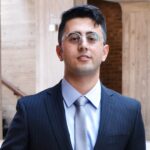
“Joint programs should not be viewed solely as a means to acquire additional degrees, but rather as opportunities to develop valuable skills, increase confidence, foster compassion, and broaden one’s perspective.”
Matin Rostamitabar – — FAME 2016-2018 alumnus
What I gained from my FAME joint Master and European Doctoral program
It is the beginning of summer 2016 and as a 21 years old freshly graduated student, I have found myself in a challenging dilemma. After a rigorous year of applying to various Master’s programs, I was fortunate to receive multiple admissions, including scholarships, from universities in Europe and Northern America. Deciding on which Master’s program to pursue, what research topic to focus on and where to live for the next few years was a significant mental challenge and drain on my willpower.
Based on my research and friends’ recommendations, determinable elements in my decision-making process would have been university ranking in my field, financial matters as well as the language, culture and job market of the host country. Nobody can deny the importance of such factors but a part of my mind was also focused on the fact that today’s world requires transdisciplinary engineers and scientists who can overcome sophisticated and multidimensional challenges on the global scale. I was seeking a unique opportunity to build up interdisciplinary skills, work across borders and buildup an international network rather than only passing multiple courses and doing short term projects.
Among my options, I selected an Erasmus Mundus Joint Master program FAME (Functional Advanced Materials and Engineering) that consisted of 7 European high-level universities from 4 countries. The possibility to start in one of two partner universities in France or Germany for the first year, then move on to another European partner university for the second year meant a rare opportunity with an exciting adventure. I could be part of European consortium and explore & choose my research interests among broad-spectrum of groups and departments. It also could provide me with a broader range of knowledge, skills, and perspectives in my field of study. On other hand, it also meant that I had to deal with two visa process, manage local bureaucracy, find new friends, secure accommodation and relocate to new city and country in less than two years. Additionally, I had to quickly adapt to different educational systems, languages, and working cultures. It sounded like a big change, but one that could lead to valuable experiences and personal growth.
Now 6 years later, in hindsight I am extremely satisfied with my decision since I had wonderful years in my selected universities in Germany & Belgium. The experience provided me ongoing personal development from the beginning, shaped by the support of my colleagues, professors, and the university environment. Throughout my studies and experiences in various labs, I discovered that my research passion lies in biobased materials, which have the potential to address global sustainability challenges. Thanks to this experience, I was able to gain a better understanding and make more enlightened decisions about my next career step too. I was confident that I would like to pursue a PhD position in a European innovative training network!
I selected a position within FibreNet, a consortium consisting of 15 European academic and industrial organizations which was financially supported by the European Commission. The project aimed to train 15 PhDs with topics that were connected and the common thread being bio-based fibers. Further, within FibreNet framework, I got the opportunity to do a joint PhD program between two universities in Netherlands and Germany. Without any doubt, I learned a lot at the six FibreNet’s offered network-wide training events in different universities and countries and they were the most joyful moments of my PhD. Thanks to the EU funding and the nature of the project, I had the chance to have secondments at three different universities which helped me to learn new skills and expand my network.
At the end of my PhD when I wanted to enter the competitive job market, I encountered an invisible benefit of my European joint studies. During interviews, I noticed that my dual degree is an asset on my CV. It demonstrates my ability to adapt to diverse international environments and proves my well-rounded skillset, making me a potential candidate for a wide range of positions within academia and industries.
Joint programs should not be viewed solely as a means to acquire additional degrees, but rather as opportunities to develop valuable skills, increase confidence, foster compassion, and broaden one’s perspective. If you are a student who is doubtful about your next educational step, you should consider such opportunities provides a great chance for self-discovery and exploration of personal and professional interests. My advice is not to pass on these opportunities!
